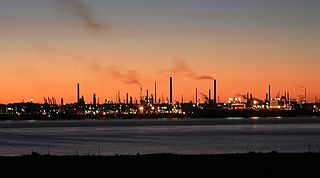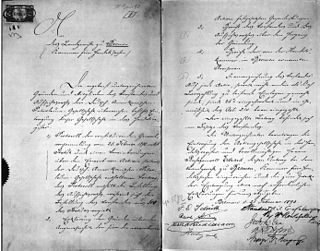Mobil is a petroleum brand owned and operated by American oil and gas corporation ExxonMobil. The brand was formerly owned and operated by an oil and gas corporation of the same name, which itself merged with Exxon to form ExxonMobil in 1999.
Standard Oil Company, Inc., was an American oil production, transportation, refining, and marketing company that operated from 1870 to 1911. At its height, Standard Oil was the largest petroleum company in the world, and its success made its co-founder and chairman, John D. Rockefeller, among the wealthiest Americans of all time and among the richest people in modern history. Its history as one of the world's first and largest multinational corporations ended in 1911, when the U.S. Supreme Court ruled that it was an illegal monopoly.

Esso is a trading name for ExxonMobil. Originally, the name was primarily used by its predecessor Standard Oil of New Jersey after the breakup of the original Standard Oil company in 1911. The company adopted the name "Esso", to which the other Standard Oil companies would later object.

Imperial Oil Limited is a Canadian petroleum company. It is Canada's second-biggest integrated oil company. It is majority-owned by American oil company ExxonMobil with around 69.6 percent ownership stake in the company. It is a significant producer of crude oil, diluted bitumen and natural gas, Canada's major petroleum refiner, a key petrochemical producer and a national marketer with coast-to-coast supply and retail networks. It supplies Esso-brand service stations.

Marathon Petroleum Corporation is an American petroleum refining, marketing, and transportation company headquartered in Findlay, Ohio. The company was a wholly owned subsidiary of Marathon Oil until a corporate spin-off in 2011.

Bayway Refinery is a refining facility in the Port of New York and New Jersey, owned by Phillips 66. Located in Linden and Elizabeth, New Jersey, and bisected by Morses Creek, it is the northernmost refinery on the East Coast of the United States. The oil refinery converts crude oil into gasoline, diesel fuel, jet fuel, propane and heating oil. As of 2007, the facility processed approximately 238,000 bbl/d (37,800 m3/d) of crude oil, producing 145,000 bbl/d (23,100 m3/d) of gasoline and 110,000 bbl/d (17,000 m3/d) of distillates. Its products are delivered to East Coast customers via pipeline transport, barges, railcars and tank trucks.

Fluid Catalytic Cracking (FCC) is the conversion process used in petroleum refineries to convert the high-boiling point, high-molecular weight hydrocarbon fractions of petroleum into gasoline, alkene gases, and other petroleum products. The cracking of petroleum hydrocarbons was originally done by thermal cracking, now virtually replaced by catalytic cracking, which yields greater volumes of high octane rating gasoline; and produces by-product gases, with more carbon-carbon double bonds, that are of greater economic value than the gases produced by thermal cracking.

Humble Oil and Refining Co. was an American oil company founded in 1911 in Humble, Texas. In 1919, a 50% interest in Humble was acquired by the Standard Oil of New Jersey which acquired the rest of the company in September 1959. The Humble brand was used by Standard Oil of New Jersey until 1973, when the company rebranded nationwide as Exxon and discontinued Humble, along with its other brands Esso and Enco.

Vacuum Oil Company was an American oil company known for its Gargoyle 600-W steam cylinder motor oil. After being taken over by the original Standard Oil Company and then becoming independent again, in 1931 Vacuum Oil merged with the Standard Oil Company of New York to form Socony-Vacuum, later renamed to Mobil and eventually merging with Standard Oil of New Jersey to form ExxonMobil in 1999.

Joseph Stephen Cullinan was a U.S. oil industrialist. Although he was a native of Pennsylvania, his lifetime business endeavors would help shape the early phase of the oil industry in Texas. He founded The Texas Company, which would eventually be known as Texaco Incorporated.

Petron Corporation is the largest oil refining and marketing company in the Philippines, supplying more than a third of the country's oil requirements. It operates a refinery in Limay, Bataan with a rated capacity of 180,000 barrels per day (29,000 m3/d). From the refinery, Petron moves its products mainly by sea to 32 depots and terminals throughout the country.

Fawley Refinery is an oil refinery located at Fawley, Hampshire, England. The refinery is owned by Esso Petroleum Company Limited, a subsidiary of Exxon Mobil Corporation, which acquired the site in 1925. Situated on Southampton Water, it was rebuilt and extended in 1951 and is now the largest oil refinery in the United Kingdom, and one of the most complex refineries in Europe. With a capacity of 270,000 barrels (43,000 m3) per day, Fawley provides 20 percent of the UK's refinery capacity. An estimated 1000 people are employed at the site.

Exxon Mobil Corporation is an American multinational oil and gas corporation and the largest direct descendant of John D. Rockefeller's Standard Oil. The company, which took its present name in 1999 per the merger of Exxon and Mobil, is vertically integrated across the entire oil and gas industry, and within it is also a chemicals division which produces plastic, synthetic rubber, and other chemical products. ExxonMobil is headquartered in the Houston suburb of Spring, Texas, though officially incorporated in New Jersey.
Port Stanvac Refinery was an oil refinery in the Australian state of South Australia located in Lonsdale, a southern suburb of Adelaide. Its construction was announced in 1958 and began refining crude oil in 1963.

As the world's largest majority investor-owned oil and gas corporation, ExxonMobil has received significant amounts of controversy and criticism, mostly due to its activities which increase the speed of climate change and its denial of global warming.
The Standard Vacuum Oil Company was an American joint venture by Standard Oil of New Jersey and Socony-Vacuum Oil established in 1931 to make and market products in the Far East. Around World War I, the market in the Far East was too large to leave unattended, but still small.

Deutsch-Amerikanische Petroleum Gesellschaft, also known as German-American Petroleum Company, was a German petroleum company that was a subsidiary of Standard Oil and was founded in 1890. From 1950 onwards the company was called the Esso Deutschland GmbH and has been a subsidiary of the ExxonMobil group since 1999.
ExxonMobil, an American multinational oil and gas corporation presently based out of Texas, has had one of the longest histories of any company in its industry. A direct descendant of John D. Rockefeller's Standard Oil, the company traces its roots as far back as 1886 to the founding of the Vacuum Oil Company, which would become part of ExxonMobil through its own merger with Mobil during the 1930s. The present name of the company comes from a 1999 merger of Standard Oil's New Jersey and New York successors, which adopted the names Exxon and Mobil respectively throughout the middle of the 20th century. Because of Standard Oil of New Jersey's ownership over all Standard Oil assets at the time of the 1911 breakup, ExxonMobil is seen by some as the definitive continuation of Standard Oil today.
American Republics Corporation was a Texas oil company that was founded by Joseph S. Cullinan in Houston, Texas in 1916. Joseph S. Cullinan owned Farmers Oil Company and other companies. Cullinan consolidated with twenty subsidiary companies into the American Republics Corporation. American Republics Corporation became the holding company for all the subsidiary. By 1927 American Republics Corporation owned two million acres of oil land, refineries, rail tankers and tanker ships. Cullinan resigned as president of American Republics Corporation in 1928. During the Great Depression American Republics Corporation was forced into receivership. In 1936 Cullinan returned and became president again. American Republics Corporation was active in supporting the World War II efforts with oil supply and tanker ships.

Following the 1911 Supreme Court ruling that found Standard Oil was an illegal monopoly, the company was broken up into 43 different entities, divided primarily by region and activity. Many of these companies later became part of the Seven Sisters, which dominated global petroleum production in the 20th century, and became a majority of today's largest investor-owned oil companies, with most tracing their roots back to Standard Oil. Some descendants of Standard Oil were also given exclusive rights to the Standard Oil name.
















